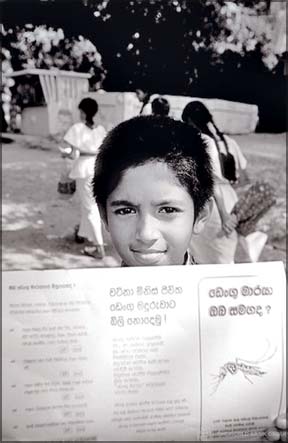|
Dengue control:
The Cuban way and the Sri Lankan way
Jayatilleke DE SILVA
Cuba is a country that has successfully combated dengue epidemics.
Its expertise is sought by many countries to combat dengue. Now two
Cuban epidemiologists are in Sri Lanka to assist her in combating the
epidemic.
How did Cuba achieve success? What was its approach to the problem?
The Cubans followed three basic principles in working out their
approach. First, they relied on scientific data that determined how to
confront and eliminate the epidemic. Second was political will or
government support. Third was mass participation of the public in the
anti-dengue campaign.

Their methodology of working was sequential. They first established a
national surveillance system with suitable technical facilities to cover
the entire population. Then the surveillance system identified the
presence and spread of the pathogen. Subsequently the government and the
public health system was alerted.
Further, the media was fully involved in creating an awareness of the
problem and their role in combating it. Such a strategy requires
coordination across all sectors and pooling of resources. Professor and
Associate Researcher at the Higher Institute of Medical Sciences, Havana
and Director of Health Tendencies Analysis Unit (UATS) Daniel Rodriguez
Milord says the Cuban Surveillance model “is based on integration,
cooperation and participation between all disciplines and institutions
in the function of public health and there is no public health without
political will on the part of the government”. For example the Cuban
system relies on even the expertise of geographers, meteorologists and
ecologists in surveying, analysing and evaluating health risks.
Hence it is wrong to assume that the Cuban system relies merely on
the application of bio-larvicides for mosquito control. The use of bio-larvicides,
however, yielded quick and lasting results. Cuba produces and uses two
types of bio-larvicides.
They are Griselesf and Bactivec. While Bactivec has been used in Cuba
since 1980, Griselesf has been in use since 1990.Both of them are
recognized by public health institutions in Bactivec is registered in
nine countries and Griselesf in 13 countries. Geographically these
countries are in Central and South America, Africa and Asia. China has
already started a factory to produce them locally.
Both products have been validated by several WHO collaborating
research centres. They are highly effective in the control of larvae of
different types of mosquitoes under most varied climates and application
conditions. They do not cause any harmful effects on animals and
plantlife. As they are bio-degradable, they are environment friendly.
Bactivec has proved to be effective in small doses against the larvae of
the Aedes aegypti mosquito. Griselesf is used in the case of large water
bodies.
What has been the Sri Lankan way? While Cuba has developed an
integrated coordinated system for surveillance and control ours has been
a disjointed system with various institutions in the healthcare system
itself being at loggerheads with one another. Nor has there been
sufficient public awareness and participation in dengue control. The
media too has taken sides, unfortunately on political allegiances of
journalists and publishing houses.
Sri Lanka is yet to set up a unified command for dengue control with
the participation of all sectors and institutions. Cuban experience also
tells us the necessity of constant surveillance and the need to use
scientific methodology and technology for the purpose.
The authorities should realize that even one death is too many. There
is also the danger of people contacting the disease for second and third
time with the risk of fatality increasing. Unfortunately there seems to
be a strong lobby that for commercial and other reasons are opposed to
the introduction of Cuban BTI to the country. They have been raising
various unfounded concerns about its environmental impact even without
bothering to find out the properties of the bio-larvicides. There was
also an attempt to cast doubts on their suitability by claiming that
they have not been certified by the WHO.
This is untrue as they are validated by the WHO and several other UN
agencies. The viscious nature of the anti-Cuban BTI lobby could be seen
from the humorous media stories about “Missing Cuban epidemiologists”
when their arrival was delayed due to changed flight schedules. |



